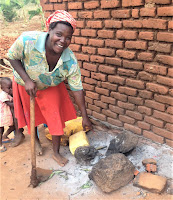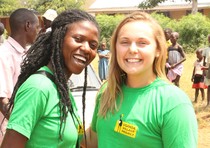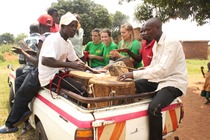By Nampiima Maria Gorret, Program
Coordinator

It took a few minutes, but she did finally smile. And once she
started, she didn’t stop.
Joyce was shy when we first started to discuss her situation, but
it didn’t last long because her passion for the subject could not be stifled.
Her journey with fistula started more than 20 years
ago when she encountered issues during childbirth in Lugazi. Joyce now
understands that the complications arose because she delayed to go to the
hospital, which she didn’t realize at the time. She somberly recounts how the
health workers tried to resuscitate her baby, but were unsuccessful. Aside from
the weight of loss, Joyce also began battling constant incontinence.
Upon returning home from the hospital, little did she know her
troubles were only just beginning. She noticed the discrimination from her community
immediately, but the separation from her family was slower to set in. It wasn’t
until she and her husband began sleeping in separate beds did she realize the
depth of her situation.
 Determined, Joyce began to seek treatment for herself; multiple
visits to various hospitals did not furnish results. Each location quoted
her enormous amounts of money to provide the treatment she needed, a price out
of reach for Joyce and her family of subsistence farmers. She fell into a deep
despair aggravated by the isolation and mockery she experienced in her
community. And then one day there was a ray of light.
Determined, Joyce began to seek treatment for herself; multiple
visits to various hospitals did not furnish results. Each location quoted
her enormous amounts of money to provide the treatment she needed, a price out
of reach for Joyce and her family of subsistence farmers. She fell into a deep
despair aggravated by the isolation and mockery she experienced in her
community. And then one day there was a ray of light.
On the radio, she heard an advertisement for the very treatment
she was seeking! A week later, in her nicest gomesi, she set out on a journey
to Kamuli Mission Hospital. Joyce received successful treatment and she did not
hide her joy. She danced and sang and hugged anyone who was close to her. She
was elated.
Joyce will soon graduate from UVP’s extended reintegration program
and has dreams to start her own business in her home community. “It has been a
life changing opportunity,” Joyce says. It’s clear that from her lengthy
experience that Joyce maintains a deep passion for obstetric fistula prevention.
Do you have a deep passion for preventing fistula like Joyce? Be part of the solution today! Joyce's story has been used with her permission.





































